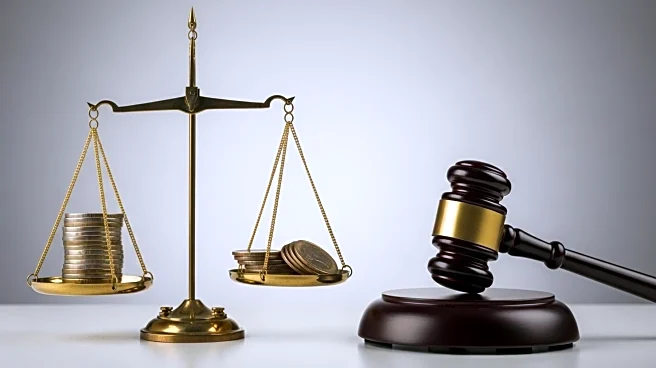What's Happening?
A federal appeals court has ruled that President Trump exceeded his legal authority by imposing broad tariffs on numerous countries, but has allowed these tariffs to remain in place temporarily. The U.S. Court of Appeals for the Federal Circuit found that Trump overstepped his powers under the International Emergency Economic Powers Act (IEEPA), a decision that largely supports a previous ruling by a federal trade court. The court's decision does not immediately nullify the tariffs, providing the administration until mid-October to appeal to the Supreme Court. President Trump has expressed his intention to appeal, arguing that the decision could severely impact the United States. The ruling challenges Trump's ability to unilaterally alter American trade policy, which has been a cornerstone of his administration's economic strategy.
Why It's Important?
The court's ruling has significant implications for U.S. trade policy and economic relations. If the tariffs are ultimately struck down, it could lead to a shift in congressional power over trade duties, potentially restoring legislative oversight. This decision could also provide relief to American businesses and consumers affected by the tariffs, which have contributed to market instability and increased costs. The ruling may influence future trade negotiations and strategies, as the administration's ability to leverage tariffs in international dealings could be diminished. Additionally, the potential requirement to refund collected tariffs poses a financial risk to the U.S. Treasury, which has seen increased revenue from these tariffs.
What's Next?
The administration is expected to appeal the decision to the Supreme Court, seeking to uphold the tariffs. Meanwhile, Congress may face pressure to reclaim its authority over trade duties, potentially leading to legislative action. Businesses and trade groups will likely monitor the situation closely, as the outcome could affect import costs and market dynamics. The ruling may also prompt discussions on the balance of power between the executive and legislative branches in trade policy.
Beyond the Headlines
The legal challenge to Trump's tariffs highlights broader questions about the scope of presidential powers under emergency laws. The case underscores the tension between executive action and legislative authority, particularly in areas traditionally governed by Congress. The decision may set a precedent for future administrations, influencing how emergency powers are interpreted and applied in economic contexts.









